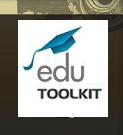EduToolkit
|
| ||||||||||||||||||||||||
Links
| EduToolkit is a ‘Grassroots Organization’ for ‘Teachers Open Online Learning’ for Professional Development. We investigate the concept of ‘The Networked Teacher’ and find out more about ‘Networked Literacy & Fluency’ in education.
- Jonas Backelin |
We will investigate the concept of 'The Networked Teacher' and find out more about 'Networked Literacy' in education. The course is based on 'Social Networking' and 'Open Education'. The participants will recieve 'Badges' as recognition for their achievements. Find out more on the course blog [3]
Overview During an inital stage it is useful to get an overview of the different social media tools available on Internet. This is an attempt to list some web tools relevant to education and link usefull resources.
Skills Development Model When I get asked to evaluate the learning outcome, two metaphors become useful. Practice will develop strength, similar to muscle growth during training, but before you practice you must know and understand intellectually what has to be done. Our knowledge is often described as complex and emergent and the way forward is to navigate the discourse, similar to riding a wave.
Our Educator Toolkit
The idea of a toolkit for the networked teacher seems daunting, but I believe certain functions and main activities will remain. Let’s start with six activities and try to find practical examples that can create specific measurable results (this is normally good to keep up the motivation):
1. Communication:
-Listen to a conference presentation
-Create a blog where you introduce yourself and your interests. Demonstrate what is your standpoint and refer (ping back or track back) to content that relate with your ideas.
2. Publishing & Sharing:
-Record your own audio or video presentation
-Upload a slide presentation to Slideshare or similar site
-Create and add social visual artifacts with tags (Flickr, Youtube etc.).
-Share your tags and social bookmarks
3. Collaboration:
-Get involved with annotation and bookmarking
-Participate in network sub-clusters (such hashtag communities based on user-defined Folksonomies) with others who share similar interests
4. Self-organization of the learning process:
-Write a blog post (or Twitter) about something you have learned or reflect on your daily practice, create new content that is important to you (add keywords or tags)
-Bookmark and tag useful sources on a site like Delicious or Diigo (subscribe tags of interest) so that you can organize knowledge in a manner that is personally meaningful
-Analyze information who are the visitors of your blog (WordPress statistic on the dashboard)
5. Creating a social network:
- Develop mutual relationships and connect through feed readers or micro-blogging
- Take contact with new people with similar interest that you stumble upon (subscribe to their feeds)
- Make new friends and professional contacts for collaboration, events participation, chatting, etc. Make direct links between your own blog and their blog.
-Join with people’s social bookmark networks
6. Searching the net:
-Do search on a topic of interest and include Google Blog Search, Google News Search, Delicious, Slideshare, and Youtube.
-Follow the hash-tags or tags in tagcloud to analyse, which tags might be of interest, find the versions of the tags for your blog. The appropriate tags will give you direct contact to people who use these tags for marking their contributions.


